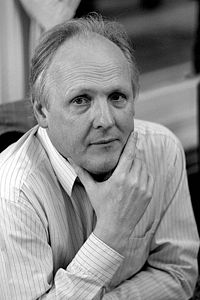Steve Furber
| Steve Furber | |
|---|---|

Steve Furber
|
|
| Born | Stephen Byram Furber 21 March 1953 Manchester |
| Residence | Wilmslow, England. |
| Nationality | British |
| Fields | |
| Institutions | |
| Alma mater |
|
| Thesis | Is the Weis-Fogh principle exploitable in turbomachines? (1979) |
| Doctoral advisor | John Ffowcs Williams |
| Doctoral students |
|
| Other notable students |
Simon Segars (CEO of ARM) |
| Known for | |
| Influences | |
| Notable awards |
|
|
Website apt manchester |
|
Stephen Byram "Steve" Furber CBE, FRS, FREng (born 21 March 1953) is the ICL Professor of Computer Engineering at the School of Computer Science at the University of Manchester and is probably best known for his work at Acorn Computers, where he was one of the designers of the BBC Micro and the ARM 32-bit RISC microprocessor.
Furber was educated at Manchester Grammar School and represented the UK in the International Mathematical Olympiad in Hungary in 1970 and won a bronze medal. He went on to study the Cambridge Mathematical Tripos at St John's College, Cambridge, receiving a Bachelor of Arts degree in mathematics in 1974. In 1978, he was appointed the Rolls-Royce Research Fellow in Aerodynamics at Emmanuel College, Cambridge and was awarded a PhD in 1980 on the fluid dynamics of the Weis-Fogh principle.
From 1980 to 1990, Furber worked at Acorn Computers where he was a Hardware Designer and then Design Manager. He was a principal designer of the BBC Micro and the ARM microprocessor. In August 1990 he moved to the University of Manchester to become the ICL Professor of Computer Engineering and established the Amulet research group.
...
Wikipedia
